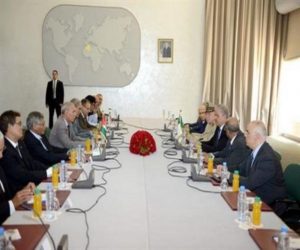 The Sahrawis settled in the Polisario-run Tindouf camps are offended by the visit Brahim Ghali paid to Algiers just a couple of days after his appointment as head of the separatist front. The Sahrawis deem Ghali’s rush to Algiers as an unconditional allegiance to the Algerian godfather that imposed him at the helm of the Polisario against the will of the Sahrawis.
The Sahrawis settled in the Polisario-run Tindouf camps are offended by the visit Brahim Ghali paid to Algiers just a couple of days after his appointment as head of the separatist front. The Sahrawis deem Ghali’s rush to Algiers as an unconditional allegiance to the Algerian godfather that imposed him at the helm of the Polisario against the will of the Sahrawis.
The Sahrawis do not nurture any illusions about the new head of the separatist front, who is so submissive to Algerian rulers. They had followed with great suspicion the election staging directed by Algiers, from the presentation of Brahim Ghali as the single “consensus candidate” to the succession of Mohamed Abdelaziz to his “election” by a Stalinist score of 93% of the vote. What a grotesque farce!
Although the Tindouf Sahrawis were offended by Ghali’s visit to his masters; they were not surprised by the official welcome he received in Algiers. They know too well that the new head of the Polisario will blindly obey the instructions of his masters, as he used to do before when he was “ambassador” in the Algerian capital. An additional evidence, if need be, that the key to the Sahara conflict has always been and still remains in the hands of the Algerian regime.
The danger at the moment is to see the Algerian generals use the Sahara conflict to divert public attention from the serious problem of President Bouteflika’s succession and present Morocco as the enemy of Algeria and Algerians.
The war raging between the various clans in Algiers is getting fiercer as the president, who suffered a stroke in 2013, has gradually lost his ability to communicate with his entourage. In this context, the generals’ temptation is all the greater to crystallize the Algerian population’s frustrations against a foreign enemy.
So it’s no coincidence that the new head of the Polisario was welcomed in Algiers, on July 13, both by Prime Minister Abdelmalek Sellal and by the highest ranking army general, Ahmed Gaid Salah, vice- Defense Minister and Chief of Staff. The Algerian regime’s double message, political and military, is thereby clear, although it is out of phase with regional and international realities.
